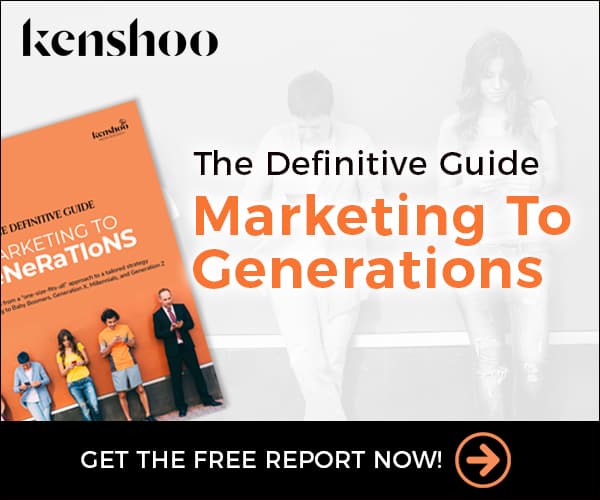Marketing to Generation Z might be one of the most important audiences to advertisers today. This group is growing quickly and are much different than Millennials, Generation X, and Baby Boomers.
Read the free Skai white paper: The Definitive Guide to Marketing to Generations.

For years, marketers and media have focused on millennials as the youngest generation of consumers. But millennials are all grown up now, and it’s time that marketers reassess what it means to market to youths. Generation Z, born after millennials from 1997 onwards, has its own tastes and preferences, as well as $44 billion in annual purchasing power.
And of course, while the youngest of this generation is still mastering tee-ball, the oldest are graduating college and starting to make their own purchasing decisions, which could mean forming brand loyalties that last a lifetime. Here are some key things to know about marketing to Generation Z.
The 4 Tenets of Marketing to Generation Z
Marketing to Generation Z tenet #1 – Meet them where they are: on mobile
While the oldest millennials can definitely remember days before wi-fi and cell phones, Gen Z has always been surrounded by technology. They started with portable DVD players, web-based games and content, and iPods, then quickly found themselves in a world with an array of app-packed smartphones with seemingly limitless possibilities…which is probably why they spend so much time online.
According to a recent study by eMarketer, U.S. teens spend around 85 hours each month on their smartphones, and smartphone usage makes up about 62% of their time online. By comparison, other generations spend an average of 41% of all their time online using smartphones. So marketing to Generation Z via desktop isn’t exactly a feasible solution for anyone hoping to reach this audience.

Marketing to Generation Z tenet #2 – Be immediately relevant…or be tuned out
It might be unfair to single out Gen Z as the “limited attention span” generation, considering most of them are literally still children. But it is important to know that Gen Z isn’t going to watch an ad that doesn’t hold their interest for long. Recent studies have shown that Gen Z has an attention span of about eight seconds, which is even shorter than the average millennial attention span of 12 seconds.
However, that’s most likely not a reflection of their intelligence. Since they’ve grown up with a constant barrage of digital advertisements, Gen Z has simply gotten pretty good at tuning out irrelevant messaging—and knowing almost instantly which messaging is and isn’t relevant.
Marketing to Generation Z tenet #3 – Know whose opinion they value most and how to influence those opinions
More than any other generation, the youngest generation of shoppers relies on word of mouth when choosing what to buy. According to The Center for Generation Kinetics, 86% of Gen Z relies on user reviews and other online opinions before making a first-time purchase. That makes sense: Baby boomers have had decades to figure out their tried-and-true favorite products, but even the oldest members of Gen Z are just starting out in the world, trying to figure out which products will become their standbys. The good news is that it’s the perfect time for advertisers to build brand loyalty, and the best way to get Generation Z to give your brand a chance is to let them hear from other fans via user-generated content (UGC), according to Forbes:
“There’s a whole new frontier of customers who have grown up in the Amazon era and wouldn’t think of purchasing anything without a plethora of UGC at key conversion points to help them along,” notes Ali Fazal, director of demand generation for Yotpo in Forbes. “Forget one or two sad reviews from some free plugin. I’m talking hundreds of reviews, user-generated photos and more. This is the new standard — not a ‘nice to have when we get big enough,’ but a must.” 
Marketing to Generation Z tenet #4 – Help them be a part of something bigger
Although they hardly seem old enough to be having an identity crisis to the crowd that remembers The Big Chill (or even Less Than Zero), Gen Z is already worried about how the world perceives them. A study by the open-access scientific journal PLOS One found that Gen Z was “distressed by messaging that casts their age group as the most narcissistic and entitled age-group ever.”
The fact that Gen Z suspects older generations of believing them to be narcissistic and entitled could be part of the reason that this generation, more than any other, expects the brands they buy to reflect their values, such as a commitment to sustainability and support of social causes. According to Sustainable Brands, half of Gen Z says that knowing a brand is socially conscious increases their likelihood of buying, and 67% report wanting to stay true to values even while making purchases. Authentically supporting causes and making sure younger audiences know they can feel good about their purchase is an important part of connecting with an increasingly socially conscious (and much-maligned) audience.
Marketing to Generation Z means rethinking not just your medium, but your message. While older generations may prefer brands keep silent on social and environmental issues, Gen Z increasingly demands that companies take a stand in a way that feels authentic. And the reward for that bold message might just be a lifetime of brand loyalty.
Read the free Skai white paper: The Definitive Guide to Marketing to Generations.






